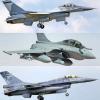MMRCA 2.0: Curious Case of India’s Military Procurement Decision Making
It appears India is in a perpetual search for the acquisition of fighter aircraft – an important arsenal for the Indian Air Force (IAF), which is woefully short of its sanctioned strength (39.5 squadrons). Although calculations available in public domain vary – ranging from sanctioned 39.5 to ambitious 42 / 46 squadrons for the IAF to maintain its combat edge – slightly over 30 current squadrons with fast depleting MiG fleet put the IAF in a difficult spot, despite braggart assertions from highest-level military commanders about India’s growing military aerospace prowess.







